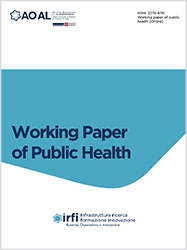First report on qualitative detection of anti-COVID-19 antibody IgM and IgG in a short series of 98 subjects, healthcare workers and patients, by use an ELISA assay

All claims expressed in this article are solely those of the authors and do not necessarily represent those of their affiliated organizations, or those of the publisher, the editors and the reviewers. Any product that may be evaluated in this article or claim that may be made by its manufacturer is not guaranteed or endorsed by the publisher.
Objective: The aim is to perform a preliminary testing about the presence of anti-COVID-19 IgM and IgG in a short series of healthcare workers and patients at SS. Antonio e Biagio e Cesare Arrigo Hospital, in Alessandria. Methods: Healthcare workers voluntarily agreed to perform the analysis. For patients, serological test was performed at clinician’s discretion. Detection of anti-COVID-19 IgM and IgG was performed separately by use ELISA assay. In order to perform a comparison age, sex, onset symptoms, RT-PCR result were collected. Results: Serological findings showed that most people with positive SARS-CoV-2 RT-PCR testing developed anti-SARS-CoV-2 IgG 14 days after the date of rhinopharyngeal swab and that anti-SARS-CoV-2 IgG detection was also observed in patients with negative RT-PCR. No anti-SARS-CoV-2 IgM was found. Conclusions: Serological testing may be useful to confirm a previous contact with SARS-CoV-2, but it cannot be used in diagnostics. They need further evidence on its performance and operational utility. At the current state of technological evolution, SARS-CoV-2 IgM and IgG antibodies serological tests can be used to supplement the viral RNA detenction by use RT-PCR.
PAGEPress has chosen to apply the Creative Commons Attribution NonCommercial 4.0 International License (CC BY-NC 4.0) to all manuscripts to be published.

 https://doi.org/10.4081/wpph.2020.9230
https://doi.org/10.4081/wpph.2020.9230




